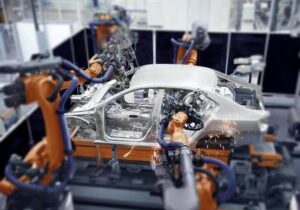How EDI Simplifies Transactions in the Manufacturing Sector
The global Electronic Data Interchange (EDI) software market is forecast to grow at a CAGR of 12% between 2023 – 2028.1
And it’s clear to see why. This technology helps manufacturing companies streamline and simplify transactions by:
- Improving operational efficiency
- Reducing chargebacks for errors
- Lowering maintenance costs
- Increasing monitoring and visibility
This blog will delve into some of the key challenges facing the manufacturing sector today and how EDI systems can help. We will also explore how third-party partners are also helping manufacturing companies maximise value from EDI implementations.
Suggested reading: If you want to find out more about EDI, check out this blog – What is EDI? The History and Future of Electronic Data Interchange.

Challenge 1: Complex and costly transactions
Similar to many industries, manufacturing is currently experiencing concerns related to inflation and economic uncertainty.
These problems lie not only in the factories, but in the supply chain too. It was found in a recent survey that growing supply chain costs are cutting into manufacturing profits by 13%.2
Among these rising costs are the processing of transactions between producers, suppliers, and clients. Manufacturers already have to deal with the cost of their materials, labour, and overhead costs, so having to factor in additional documentation and administrative activities on top of that is a harsh dent to their bottom line.
CEOs have tried to cut costs by getting existing IT team members and supply chain managers to handle data interchange, but this leads to too much time invested in manual processes – this is especially a problem when it comes to complex transactions involving multiple suppliers.
How EDI can help
Automation is the key. Wisely, many manufacturers are automating their production processess to great effect, and so they need to apply a similar strategy to their data interchange methods.
This is where EDI comes into play. EDI can automate and semi-automate a wide range of time-consuming processes that manufacturers have to deal with, such as:
- Delivery forecast (DELFOR)
- Delivery just-in-time (DELJIT)
- Invoices (INVOIC)
- Despatch advice (DESADV)
Investing in an automated EDI solution means that those team members who are having to spend their time on admin can now put their skills back into production and client management – activities that more tangibly generate profit. It also means that companies don’t have to spend on unnecessarily hiring more staff to do these jobs.
While a recent survey found that manufacturing companies are estimated to automate 50% of their tasks by 2025,3 it was not clear whether data interchange was included in this. Given the cost-effective benefits of EDI, its apparent that it absolutely should be.
Challenge 2: Cybersecurity threats
The manufacturing industry deals with huge quantities of purchase order invoices, business documents, and sensitive client data. This makes it an attractive target for criminals and cybersecurity is quickly becoming a business-critical issue for manufacturing companies.
A recent Deloitte survey with 225 manufacturing executives found that nearly 50% felt they weren’t protected from a cyber breach, with 75% admitting their companies lacked cybersecurity resources. Of those surveyed, 39% said they had experienced a breach within the last year and 38% of those losses were between $1 million and $10 million.4
How EDI can help
While not a security system in itself, EDI is a well-established, secure form of data transfer that adheres to compliance standards within manufacturing supply chains.
Let’s look at some of the key security features of EDI documents:
- EDI transactions are sent in a traceable and secure electronic format. This gives the files a clear footprint to follow so that their journey can be monitored and improved upon if need be.
- Many EDI protocols such as OFTP2 and AS2, come with full encryption capabilities. This means that the messages they send, such like shipment notices and purchase order acknowledgements, are protected and cannot be intercepted.
- EDI systems also offer digital identification certificates and Message Disposition Notifications (MDNs) to further enhance data security. MDNs are important elements of data transfers because they inform the sender that the message has been received by the recipient via an electronic receipt.
Challenge 3: Supply chain visibility
Clients and partners are becoming more demanding and this has caused significant disruptions to supply chains in recent years.
It’s expected of manufacturers to provide real-time production reports, tracked deliveries, and easy returns. The increased desire for transparency and efficiency is putting a lot of pressure on supply chains to operate faster and with fewer mistakes.
Despite this, stats show that only 6% of companies have complete visibility across their supply chain and 21% of companies have no visibility beyond their tier-1 trading partners and suppliers.
Navigating complex supply chains and achieving supply chain visibility is one of the biggest challenges facing the manufacturing industry.
How EDI can help
An EDI solution offers enhanced visibility over supply chains and gives manufacturing companies the data they need to identify and resolve supply chain issues efficiently.
Let’s look at some of the key ways that EDI can help manufacturing companies overcome supply chain challenges today:
- EDI can optimise virtually every aspect of the supply chain, enabling companies to obtain a more holistic supply chain view while also increasing trading partner adoption.
- EDI software can simplify operational processes and facilitate easy supply chain access worldwide.
- EDI also improves communication among trading partners by providing a common trading language, resulting in more efficient and productive supply chains.
As demand for supply chain agility and transparency grows, EDI will continue to play a crucial role in streamlining supply chain operations in the manufacturing industry.
Suggested reading: If you want to learn more about how EDI software can deliver a competitive advantage, take a look at our eBook – The Supply Chain Centred Business
Navigate EDI Easier with Data Interchange
EDI is capable of simplifying transactions in the manufacturing sector by offering businesses total supply chain visibility, automation, and improved security.
However, managing and maintaining an EDI solution in-house can be a serious challenge and requires an extensive, expert team. This is where an expert EDI partner like Data Interchange can help.
Data Interchange is a specialist EDI-managed service provider with over 35 years of experience. We can help you design and implement an effective EDI solution that is tailored to your business needs, ensuring that EDI implementation achieves maximum value.
If you’d like to find out more about how an EDI partner can simplify transactions and support your manufacturing business now and in the future, talk to an expert today.

3 The Most Surprising Automation In Manufacturing Statistics And Trends in 2023 | Gitnux













































































































